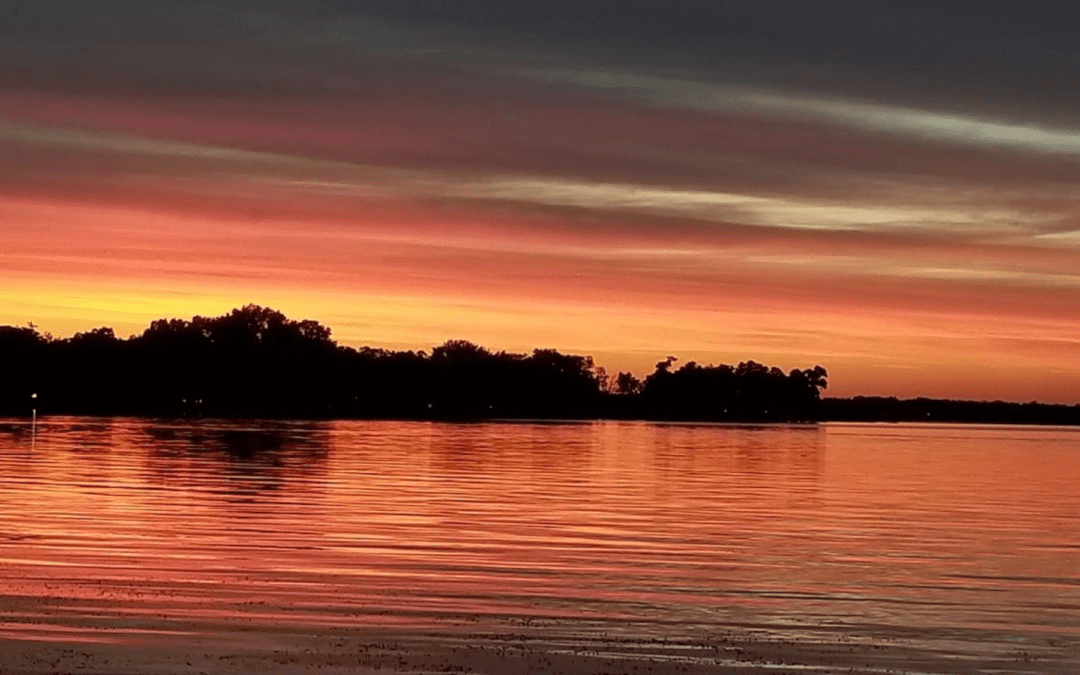Author: Melinda Goedeke
As the sun sets and the red hues slowly drip into the lake, I pause and watch. Peace washes over me as I breathe slowly noting the sound of my breath. It is a stark contrast to the rapid, somewhat panicked breathing I know all too well. The sunset isn’t unusually remarkable, but my pause is. The sun will set again, but I might not notice it. I might not pause. I might not breathe peacefully. This time, however, I do sit enveloped in the distorted reflection slowly disappearing on the lake while I ignore the black flies biting my ankles, the heat cooking my calves and the dishes staring at me. I can see beauty. I can breathe. I am not in the eye of a tornado.
My daughter was both a sunset and a tornado. She was diagnosed with bipolar II rapid cycling when she was 20 years old. Imagine how both our lives would have been if I had been better able to pause more frequently and note the unique colors of her life. Instead, I spent many days deep in the tornado’s spin taking cover from the havoc I knew was going to come; I just didn’t know what that havoc would look like nor who the survivors would be. What I did know was that I was going to pick up the pieces of people’s hearts, repair damaged property and help direct her to a place of quiet as she plummeted to a restless often disassociated sleep. No option for my own disassociation. I am her mother. I will stay vigilant. Alert. I will listen for the sirens. I accept this is who she is in part – a tornado.
And she was a sunset. Her beauty was remarkable – a true cause for pause. She created wonder wherever she went and left people wanting to be part of her life. She was extraordinary in the way the word was meant – beyond. You felt alive around her as if you had energy you never had before. She could not be contained nor categorized as she was beyond compare. Her inner beauty oozed out of her infectious laugh and can-do attitude. Her warm embraces were given unsolicited because she had the uncanny ability to see the pain in your eyes. And yet she was blind. She couldn’t see her own gifts. She couldn’t see the reflection in our eyes. She only knew the tornado and claimed it as who she was – destructive, scary, someone to take cover from.
I knew and loved both the sunset and tornado. In fact, I’m one of the lucky ones who was in her inner circle yet not in her tornadic path. My wondering is why people forget that we are all complex, including those with mental illness. Laura was not all tornado nor all sunset. She was a dynamic, changing, multi-faceted warrior.
As a retired teacher and a mother of a daughter with bipolar II, rapid cycling, I know what it is like to only see the mental illness and not the mental health. In helping students and my daughter, it was easy to get lost in their struggles pushing them through the smallest crack in the door to find success or even a moment of value. Pushing them to believe in themselves, make good choices and every other cliche that we say. I celebrated the “wins” with them, but to themselves and most people in their lives, they were just tornados – someone to be dealt with or even take cover from. They sometimes became their diagnosis. This student has ADHD rather than this student is an amazing artist; my daughter has bipolar disorder rather than my daughter is a brilliant biomedical engineer. Caught up in the funnel cloud, caregivers often miss the sunsets. We spend so much time in the aftermath of the illness that we forget to focus on the gifts that the illness also gives. Laura felt big, lived big, laughed big. She touched more lives in a more profound way in her 24 years than I ever will.
Laura lost her battle with bipolar, but she was more than a tornado. She was a sunset full of vibrant colors bouncing off the horizon right in front of you. Impossible as it may, consider pausing, and even amidst the chaos, the fear, the devastation, note the beauty and take a breath.
The content of the International Bipolar Foundation blogs is for informational purposes only. The content is not intended to be a substitute for professional medical advice, diagnosis, or treatment. Always seek the advice of your physician and never disregard professional medical advice because of something you have read in any IBPF content.


